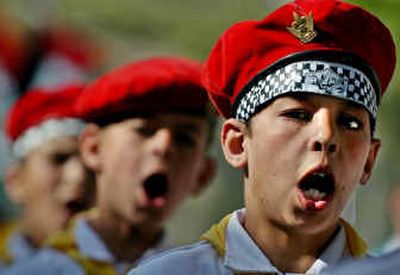Abbas plans elections as scheduled

JERUSALEM – Palestinian leader Mahmoud Abbas said Saturday he planned to hold parliamentary elections on schedule, while the militant Hamas threatened to reconsider its already shaky truce with Israel if the July 17 vote is delayed.
Other Palestinian officials, however, left open the possibility that the vote could be held up until after Israel’s evacuation of settlements in the Gaza Strip and West Bank, scheduled to begin in late July.
“We have no intentions or desire to delay these elections,” Abbas told reporters at his West Bank headquarters.
But the Islamic militant group Hamas, expected to make a strong showing in its first legislative contest, suspects Abbas’ ruling Fatah party wants to buy time to try to recover some of the popular support it has lost to Hamas.
“Now there are indications that the Palestinian Authority has intentions to delay the elections,” Hamas spokesman Sami Abu Zuhri said. “In the event the situation continues as is … the Hamas movement will be pushed to re-evaluate its position on the truce that is on the verge of collapse.”
Abbas and Israeli Prime Minister Ariel Sharon agreed on a cease-fire in February.
Hamas agreed to adhere to the truce in part because Abbas pledged to reform the Palestinian Authority. Now Abbas finds himself caught between that pledge and pressure to buoy Fatah’s electoral prospects.
Abbas’ Information Minister Nabil Shaath suggested the vote might be held up until Israel completes its withdrawal from the Gaza Strip and parts of the West Bank.
“The question really has to do with the Israeli pullout of Gaza during that time, and our fear that the Israelis might make it difficult for people to do real election campaigns and have real freedom of movement,” he said.
Hamas has said it would only participate in the race if the election law were revised to give better representation to smaller parties.
The Palestinian election commission had said parliament must amend the law no later than three months before the balloting – that is, by today. But Palestinian lawmaker Hanan Ashrawi said the vote would not be held until later this week. A top election commission official, Ammar Dwaik, said passage of the law a few days late would not hold up parliamentary elections, but a month’s delay would.
Shaath said that if Hamas wanted elections to go ahead on time, it could yield on its demand for electoral modifications and run under the prevailing law.
Hamas, which is sworn to Israel’s destruction and has killed hundreds in dozens of suicide bombings, seeks influence in parliament to block concessions to Israel and battle Palestinian government corruption.
Hamas is expected to wrest from Fatah the support of many Palestinians fed up with the ruling party’s corruption and ineffectiveness. But Fatah hopes it can recoup some of that lost backing if given more time. In January, Hamas roundly defeated Fatah in 10 municipal elections in Gaza, and chipped away at the ruling party’s power in a local West Bank race a month earlier.
But Shaath said he doubted Fatah was headed for a beating in the July vote.
“If people want to judge things by the results of the 83,000 people who voted in 10 small constituencies in Gaza, I think everybody is seriously mistaken,” he said.